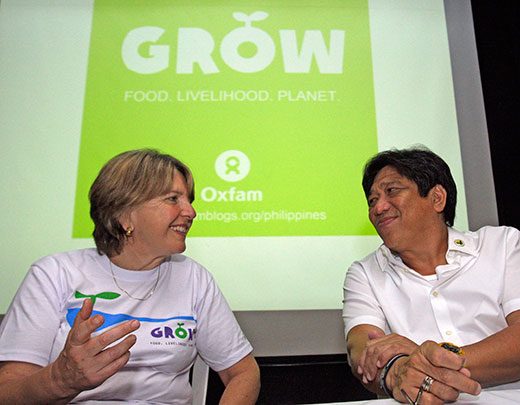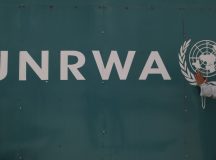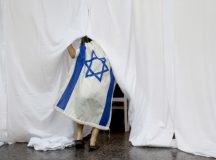Will the new partnership between the Board of Deputies of British Jews and Oxfam challenge the global NGO-led campaign to delegitimise Israel or inadvertently lend that campaign legitimacy?
In early 2013, after a long and difficult debate, the Board of Deputies of British Jews (BoD) approved a programme to sponsor Jewish volunteers to work with mentors from Oxfam Great Britain. These activities will take place under the banner of the ‘Grow/Tatzmiach’ project, whose official objective is to ‘tackle injustices in the international food system’ and ‘to make sure that everyone on the planet has enough to eat’. The volunteers will participate in a weekend training session with ‘Oxfam professionals and Jewish social advocates’, followed by the creation and operation of a joint ‘social justice project’.
Although this project reflects the importance of chesed, tzedakah, and tikkun olam (kindness, charity, and repairing the world) in Jewish tradition, the motivation for the BoD-Oxfam partnership stems from friction over the anti-Israel positions and lobbying of the UK-based NGO network, which includes Oxfam. This network is highly influential and many parts of the Jewish community are alienated from it. While largely unspoken, proponents of the programme within the Jewish leadership are seeking to repair this relationship, hoping to offset the myths, anti-Israel spin, and involvement in theological antisemitism of the NGO community.
Opponents of this cooperation present a very different analysis, in which the BoD and the Jewish leadership are seen as giving legitimacy to NGO activities in support of demonisation, including BDS (boycotts, divestment and sanctions) and ‘lawfare’ campaigns. As part of this agenda, Oxfam has promoted the narrative that paints Israel as an evil aggressor or apartheid state, while erasing Palestinian terror and its many victims. Given this record, they argue, what realistic hope is there for a major change in the corporate NGO culture? Instead, these critics warn that official Jewish cooperation will only signal surrender in a political war, allowing the NGOs to reclaim their moral standing within the Jewish community and beyond, as well as clawing back lost influence and funding from supporters of Israel, while continuing their destructive campaigning.
The Durban strategy
The global NGO-led campaign to delegitimise Israel was launched at the NGO Forum of the September 2001 Durban World Conference Against Racism. Over 5,000 activists from 1,500 non-governmental organisations claiming to promote idealist and moral agendas convened in South Africa, under the auspices of the UN Commission on Human Rights, ostensibly to celebrate the end of apartheid and to launch a new campaign to eliminate racism and discrimination worldwide.
Behind the moral rhetoric, however, the Durban NGO Forum was exploited as a vehicle for promoting political warfare against Israel. It featured numerous expressions of antisemitism, and the final declaration focused on labelling Israel an ‘apartheid state’ guilty of ‘ethnic cleansing’, ‘genocide’, and ‘war crimes’. The NGOs’ goal, as explicitly stated, was the ‘complete and total isolation of Israel as an apartheid state,’ following the South African model. As noted by Professor Irwin Cotler, an expert on human rights, a lawyer for Natan Sharansky and Nelson Mandela, and a leader of the Canadian delegation to the Durban diplomatic forum, the conference to end racism was itself an exercise in racism.
In the decade that followed, the Durban strategy has been implemented through campaigns of demonisation in the form of BDS, ‘lawfare’ cases seeking to label Israeli political and military leaders as war criminals, efforts to block the sale of military equipment to Israel, and the exploitation of terms such as ‘apartheid’. Powerful political NGOs have played a central role in this strategy, including War on Want, Amnesty International, Human Rights Watch, and Oxfam.
In many instances, the Durban strategy has been accompanied by blatant antisemitic images, language and content. War on Want has referred to Israel as a ‘Nazi state’ guilty of creating ‘ghettos’ for Palestinians, and uses terms such as ‘apartheid’, ‘slavery’, and ‘ethnic cleansing’. Its website has featured a photo of a swastika inside the Star of David. Christian theological themes have been reflected in Christmas cards depicting Mary and Joseph encountering a Bethlehem that is ‘effectively sealed off from the outside world by Israel’s ‘Separation Wall’’ and ‘Mary and Joseph being frisked on their way to find an inn for the night.’
Similarly, Christian Aid’s ‘Child of Bethlehem’ Christmas Appeal linked the suffering of Palestinian children with that of Jesus. It revived centuries of blood libels against the Jewish people, providing ‘worship resources which make connections between the Bethlehem of Christ’s birth and the contemporary situation in the Middle East.’ Such practices have been defined as the ‘new antisemitism’ by the All-Party Parliamentary Group against Antisemitism, and in the scholarly analyses of Robert Wistrich, Anthony Julius and others.
The NGO-led demonisation campaign has led to attacks and demonstrations against stores in the UK and elsewhere that sell Israeli products (such as Ahava, Max Brenner chocolates, and Soda Stream), disruptions of Israeli cultural performances and presentations by diplomats, and academic boycott campaigns on university campuses. In addition, NGOs have pursued ‘lawfare’ cases, in which Israeli officials (military and civilian) are harassed through the exploitation of universal jurisdiction statutes and the false label of ‘war criminals’.
The political power of the NGOs has been magnified by government outsourcing of humanitarian and development aid. NGOs such as Oxfam, War on Want, Christian Aid, and their many counterparts in Europe receive massive state funding, in return for which they are responsible for setting aid priorities and implementing programmes. A similar process of outsourcing in the area of human rights has led to the empowerment of NGOs such as Amnesty International and Human Rights Watch. At the same time, the ‘halo effect’ granted to these NGOs, as ostensibly politically neutral moral actors, provides significant immunity from the kind of accountability and criticism to which governments and political leaders are routinely subject.
As the NGO network has grown in resources and influence, these groups have also become more political in their activities, as reflected in their priorities and the extension of their areas of activity. Many have moved from providing assistance and building humanitarian facilities to playing central roles in political advocacy and lobbying of government offices. In this context, powerful NGO officials with strong ideological biases have been able to translate their agendas into policies.
In this advocacy, the NGO community and many of its officials often promote post-colonial ideologies, which blame the West (particularly the US and Europe) for the ills of the ‘global South’ or the under-developed world, and understate the criticism of dictatorships and terror groups (or liberation movements). In this political culture, Israel and Zionism (Jewish nationalism) are labelled as powerful aggressors intricately connected with Western ‘imperialism’ and ‘neoliberalism’, while Palestinians are automatically labelled as weak victims.
In the process, government officials receive a steady flow of NGO reports, including many that consist of allegations of Israeli violations of humanitarian norms and human rights practice, often accompanied by highly publicised news conferences and media campaigns. The now discredited Goldstone report, issued in 2009, consisted of numerous unsubstantiated allegations, largely copied from publications of Amnesty International, Human Rights Watch, and their Palestinian and Israeli partners. This and similar documents were presented to the International Criminal Court as evidence of war crimes, and were used in efforts to block the export of technology and components for use by the Israel Defence Forces.
These NGO campaigns constitute the core of the intense political war designed to delegitimise and isolate Israel in the international community, in line with the strategy adopted in the final declaration of the Durban NGO Forum.
Engagement: Oxfam as a test case
Given this background, the Jewish leadership on the Board of Deputies chose Oxfam as a starting point for efforts to address the NGO campaigns. As one of the largest and most powerful groups, Oxfam’s structure and leadership potentially present some opportunities for cooperation. If the NGO’s leaders and community of supporters are concerned about the costs from their involvement in promoting anti-Israel political campaigns and act on this concern, this could be a significant precedent. In London’s extensive NGO network, the impact might spread to other powerful groups that contribute to the highly corrosive demonisation process, including Amnesty International and Christian Aid. In the long term, the most extreme groups, such as War on Want, would be isolated, and lose credibility as well as impact.
Oxfam is a prime example of NGO power, and the practice of governmental outsourcing of humanitarian aid. Its international framework is formed by 17 national organisations operating in 92 countries. In 2010-2011, Oxfam International and its affiliates had total revenue of €894 million, of which a significant portion is provided by governments, including the EU and its members. Oxfam International and its affiliates reported spending €9.5 million in the West Bank and Gaza in this period.
In examining Oxfam’s record, the evidence suggests that the leaders are not politically homogeneous and there is greater diversity and less post-colonialist ideological influence than in many other political advocacy NGOs. Expressions from Oxfam’s leaders of anti-Israel bias are less frequent and less blatant than from key individuals in groups such as War on Want, Amnesty, Christian Aid, and Human Rights Watch. On this basis the case is made that engagement and cooperation through programmes such as ‘Grow/Tatzmiach’ are an appropriate response to NGO-led demonisation.
In contrast, critics of cooperation cite Oxfam’s record of involvement in the Durban demonisation strategy, suggesting that hopes for an impact via engagement and cooperation with the Jewish leadership lack a realistic foundation.
In 2003, for example, Oxfam Belgium produced large posters featuring an orange dripping blood, with the phrase ‘Israeli Fruits Have a Bitter Taste’, promoting the boycott of Israeli products. The posters were copied and distributed in many languages across Europe. In October 2006, Oxfam together with Amnesty International, issued a report and launched a campaign on arms exports that specifically singled out companies in the US and UK for having links with Israel, based on highly distorted and often false allegations made by Human Rights Watch regarding the 2006 Second Lebanon War. The report called on EU countries to ‘refuse exports of the full weapons system directly to Israel.’ In 2009, Oxfam severed ties with actress Kristin Davis due to her work endorsing Israeli Ahava cosmetics, an action taken in the context of the BDS campaign, which featured violent demonstrations against businesses in London and elsewhere that sell Ahava products.
As part of ‘targeted’ BDS focusing on goods produced ‘under occupation’ beyond the 1949 armistice line (the Green Line), Oxfam’s lobbying (together with War on Want) played a central role in the Department for Environment, Food and Rural Affairs (DEFRA) recommendation to label West Bank products as ‘Israeli settlement produce’ or ‘Palestinian produce’. In this campaign singling out Israel, Oxfam sent a public letter to Prime Minister Gordon Brown advocating a blanket labelling policy, and joined other political advocacy NGOs in lobbying against a planned upgrade in EU-Israel relations. In addition, Oxfam is a funder of Crisis Action, an NGO umbrella group whose publications (such as ‘Trading Away Peace’, 2012) single out Israel and which promotes BDS campaigns and efforts to undermine Israel’s relationship with the European Union.
Oxfam’s role intensified in 2012 with a series of provocative confrontations involving illegal Palestinian construction in the Jordan Valley and other parts of Area C – territory under Israeli control according to the 1993 Oslo agreements that created the Palestinian Authority. Such confrontations were again justified by repeating the narrative of Palestinian victimisation and by depicting Israeli policy as the sole impediment to Palestinian development. Israel’s Embassy in London sharply criticised Oxfam for placing ‘a clearly political agenda above any humanitarian concern.’ The Embassy further argued that Oxfam’s call ‘to the international community and to NGOs to initiate projects which clearly violate existing agreements is irresponsible and inflammatory. Far from advancing peace, such an approach undermines the prospects of reaching a negotiated resolution to the conflict.’
The intense promotion of a narrative which erases the context of terror and hatred, is deeply ingrained in Oxfam activities and publications, including the blogs that are posted on Oxfam’s website, Facebook page and other social media. Instead of blaming Hamas for holding the population of Gaza hostage and devoting resources to building and smuggling weapons to attack Israel, Oxfam blames Israel and repeats the NGO cliché that refers to Gaza as ‘the world’s largest prison’ (echoing a phrase used frequently by War on Want and other UK-based anti-Israel groups). During the IDF’s November 2012 operation in response to renewed rocket attacks against Israeli civilians, Oxfam’s public statements equated deliberate terrorist attacks launched from civilian areas and directly targeting civilians, with Israeli self-defence. Once again, the full impact of Oxfam’s very powerful political and public relations machine was used to condemn Israel’s military activities, while offering no alternatives to protect the population from terror.
Given these and many other examples of Oxfam’s involvement in demonisation and political warfare, opponents of cooperation, including BoD delegates, note that these activities, like those of other NGOs linked to the Durban strategy, go far beyond legitimate, informed and constructive criticism of Israeli policies. The scale of this soft power war led by NGOs and its impact are entirely unique in international relations.
Assessing the experiment
The basis for the Board’s cooperative project with Oxfam is the hope that this engagement will encourage Oxfam officials to recognise the moral and substantive damage that has been caused by their role in the Durban strategy, and so will lead to policy changes. However, Oxfam is a huge and complex organisation, and it will be difficult to make progress among those who share the post-colonial anti-Israel ideology and are deeply committed to BDS and demonisation. They can be expected to oppose changes that would end involvement in the Durban strategy.
Therefore, as the co-operation with the Board under the ‘Grow/Tatzmiach’ programme expands, the expectations for change might easily turn to disappointment. More Oxfam statements attacking Israel will trigger a very divisive conflict within the Jewish community, between those who will accept Oxfam’s explanations or minimise the infraction, and others who will say ‘we told you so.’
It will be important to combine engagement with other approaches and to exact visible costs for all future Oxfam involvement in BDS, lawfare, and other forms of demonisation. In this context, it will be necessary to monitor Oxfam’s behaviour very closely. If the Jewish leadership adopts a policy of silence or quiet protest in such cases, in order to protect the cooperative project, they will lose any hope of influencing this and other members of the NGO community. Engagement must not become an end in itself.




































